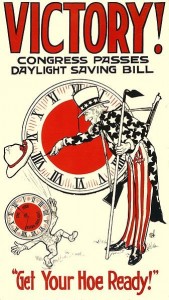 1.6 billion people – almost a quarter of the world’s population – observe the biannual shifts between standard and daylight saving time. Does the loss of an hour’s sleep in the spring affect their health? According to a study published in The New England Journal of Medicine, there’s a statistically significant increase in the number of heart attacks (myocardial infarctions) in the week after we shift to daylight saving time.
1.6 billion people – almost a quarter of the world’s population – observe the biannual shifts between standard and daylight saving time. Does the loss of an hour’s sleep in the spring affect their health? According to a study published in The New England Journal of Medicine, there’s a statistically significant increase in the number of heart attacks (myocardial infarctions) in the week after we shift to daylight saving time.
Researchers in Sweden extracted statistics from 20 years worth of data on heart attacks. They compared the incidence of heart attacks during each day of the week after we change the clocks (both spring and fall) with the number of heart attacks two weeks prior to and two weeks after the time change.
There are always more heart attacks on Mondays, presumably connected to the stress of going back to work. But the number of Monday heart attacks was significantly lower following an extra hour of sleep in the fall. In fact, except for Fridays, the number of heart attacks was lower for the rest of the week. Following the loss of an hour’s sleep in the spring, heart attacks were up for the entire week, and the increase was especially significant on Tuesday.
Here’s the data displayed graphically.
Monday heart attacks and sleeping in on the weekend
These findings, of course, do not mean that losing an hour’s sleep causes a heart attack, but they do suggest that individuals who are vulnerable to heart problems might want to make the transition to daylight savings time gradual rather than abrupt.
The authors of the study write:
It has been postulated that people in Western societies are chronically sleep deprived, since the average sleep duration decreased from 9.0 to 7.5 hours during the 20th century.4 Therefore, it is important to examine whether we can achieve beneficial effects with prolonged sleep. The finding that the possibility of additional sleep seems to be protective on the first workday after the autumn shift is intriguing. Monday is the day of the week associated with the highest risk of acute myocardial infarction, with the mental stress of starting a new workweek and the increase in activity suggested as an explanation. Our results raise the possibility that there is another, sleep-related component in the excess incidence of acute myocardial infarction on Monday. Sleep-diary studies suggest that bedtimes and wake-up times are usually later on weekend days than on weekdays; the earlier wake-up times on the first workday of the week and the consequent minor sleep deprivation can be hypothesized to have an adverse cardiovascular effect in some people. This effect would be less pronounced with the transition out of daylight saving time, since it allows for additional sleep. Studies are warranted to examine the possibility that a more stable weekly pattern of waking up in the morning and going to sleep at night or a somewhat later wake-up time on Monday might prevent some acute myocardial infarctions.
Who can we blame for this?
In honor this weekend’s shift, once again, to daylight saving time, Howard Mansfield provides a brief history of time in the US. In the 19th century, cities set their clocks to local time, determined by the sun. This became inconvenient for railroad timetables, and the country was divided into four standard time zones in 1883.
We adopted daylight saving time (during World War I), rejected it (after the war), adopted it again (during World War II), and then left it up to the states and localities until 1966, when Congress once more decided it was a national concern. And as much as we complain and point out that it doesn’t make anyone more productive or save any energy, it persists. Almost every state has eight months of it each year and only four months of so-called standard time.
Related posts:
Teens benefit from later school start time
Links of interest: Sleep
The “lie down and die” model of sleep
Couples who prefer to sleep alone: Your room or mine?
High school students should sleep in
Resources:
Image: Providence Examiner
Imre Janszky, M.D., Ph.D. and Rickard Ljung, M.D., Ph.D, Shifts to and from Daylight Saving Time and Incidence of Myocardial Infarction, The New England Journal of Medicine, October 30, 2008, Vol. 359, pp. 1966-1968
Daylight Saving Time Disrupts Humans’ Natural Circadian Rhythm, ScienceDaily, October 25, 2007
Howard Mansfield, Does Anybody Really Know What Time It Is?, The New York Times, March 10, 2011
Meredith Melnick, The Lasting Effects of Lost Sleep, Time, March 12, 2011
TA Lahti et al.,Transition to daylight saving time reduces sleep duration plus sleep efficiency of the deprived sleep, Neuroscience Letters, October 9, 2006
DR Witte et al., Excess cardiac mortality on Monday: the importance of gender, age and hospitalization, European Journal of Epidemiology, 2005, 20(5), pp. 395-9


Sorry, comments are closed for this post.